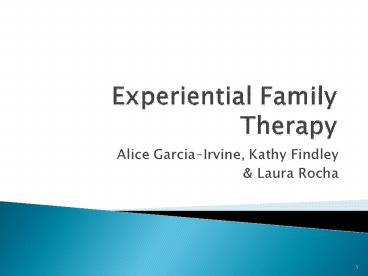Experiential Family Therapy - PowerPoint PPT Presentation
1 / 20
Title:
Experiential Family Therapy
Description:
'The root cause of family problems is emotional suppression' and ... Psychotherapy of the Absurd (Whitaker) 18. Gus Napier. Carl Whitaker (3 generation rule) ... – PowerPoint PPT presentation
Number of Views:2732
Avg rating:3.0/5.0
Title: Experiential Family Therapy
1
Experiential Family Therapy
- Alice Garcia-Irvine, Kathy Findley
- Laura Rocha
2
History of Experiential therapy
- Emerged from humanistic-existentialist movement
of the 1960s - Drew from
- Gestalt Therapy
- Psychodrama
- Client-centered
- Encounter-group movement
3
Main premises
- The root cause of family problems is emotional
suppression and denial of impulses - Individuals-fulfilling roles
- Bridging the family-second priority
4
Theoretical Key Concepts
- Emphasis on freedom
- Emotional experiences
- Here-and-now
- Honest emotion
- Individual before the family
5
Theoretical Philosophy
- Humanistic
- People are good
- Honest emotions
- People are resourceful, energetic, creative
- Existentialist - freedom of choice
6
Innovators and History
- Carl Whitaker (1912-1995)
- Anti-theoretical
- Be yourself
- Intuition
- Virginia Satir (1916-1988)
- Communication
- Individual self-expression
7
Resurfacing
- Experiential family therapy lost popularity
- Then resurgence of trends of therapy
- Key figures
- Leslie Greenberg and Susan Johnson
- Richard Schwartz
8
Emotionally focused couples therapy
- Greenberg and Johnson (1985)
- Attachment theory
- Emotion as communication
- Defenses
- Deeper emotions
9
Richard Schwartz
- Internal Family Systems model
- Clients confront sub-personalities
- parts
- disowned selves
- Conflict in others (family, friends)
- Conflicts with/within self
10
Problem Families
- Confuse instrumental expressive functions of
emotions - Control emotions of children
- Dull emotional experience
- Not tolerant of individuality
- Victims (children of these families)
- Boredom, apathy and anxiety later
11
Satir and problem atmospheres
- Satirs observations
- Emotional deadness
- Cold affect
- Dont enjoy the family
- Lack of warmth
- Avoidance by work/school
12
Satir continued
- Destructive communication in smothering feelings
- Blaming
- Placating
- Being irrelevant
- Being super reasonable.
- All are due to low self-esteem
13
Satirs approaches
- Spontaneous
- Did not allow complaining
- Used positive connotation
- Taught affection
- Loving, yet forceful
- Use of touch as communication
- Was present and supportive
14
Normal Family Development
- Innate inclination toward self-actualization
- Conflicts with social structure
- Not a lot of parental control
- No restriction of childs emotions
- Sharing experiences
- Open, natural, spontaneous
15
Problematic Behaviors
- Suppression of feelings
- Denial of impulses
- Lack of warmth
- Avoidance
- Security rather than satisfaction
16
Qualities of therapist
- Creative and spontaneous
- Unblock awareness
- Support individuation
- Force personality on family
- Caring and accepting
- Increase experience levels
- Increase affect
- Dont diagnose
17
Goals of therapy
- Personal integrity
- Expand experience
- Liberate affect and impulses
- Little focus on presenting problem
- Promote communication
- Promote interaction
18
Primary Techniques
- Family Sculpting
- Family Puppet Interviews
- Family Art Therapy
- Conjoint Family Drawings
- Animal Attribution
- Play Therapy Techniques
- Role-Playing
- Gestalt Therapy
- Psychotherapy of the Absurd (Whitaker)
19
Nonconformists
- Gus Napier
- Carl Whitaker (3 generation rule)
- Two therapists
- Personal encounter
- Joined family
- Confrontational
- to overemphasize either the individual or family
connectedness is to distort the human condition
(David Keith)
20
References
- Goldenberg, I., Goldenberg, H., (1991).
Family therapy an overview (3rd ed.).
Belmont, CA Brooks/Cole. - Nichols, M., (2008). Family therapy concepts and
methods (8th ed.). Boston Pearson Education. - Piercy, F., Sprenkle, D., (1986). Family
therapy sourcebook. New York Guilford Press





























![[PDF]❤️DOWNLOAD⚡️ Crisis Counseling and Therapy PowerPoint PPT Presentation](https://s3.amazonaws.com/images.powershow.com/10039191.th0.jpg?_=20240525040)

